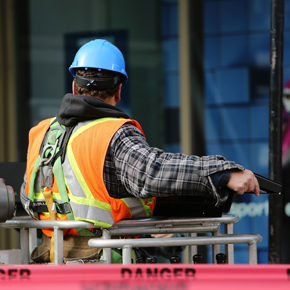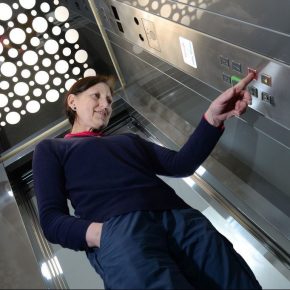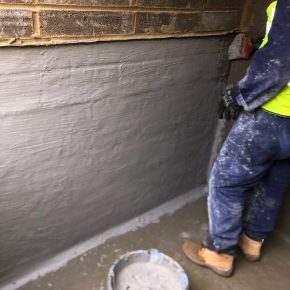
5 top tips for health and safety in the construction industry
Shaun Higgins, Managing Director of IML Labels and Systems, discusses the Health and Safety at Work Act, and looks at the responsibility of employers to ensure the workplace is a healthy and safe place for employees, as well as touching upon the part that workers must play too.
To begin with, it is important to mention that under the Health and Safety at Work Act, workers have a duty to ensure that they undertake all work in a safe manner, also taking into account the safety of everyone else around them.
The construction industry has been under fire in recent years when it comes to health and safety. In 2016, UK companies paid over £61 million in health and safety fines, with construction the hardest industry hit, forking out a bill of £13.5 million.
According to a nationwide poll, over half of property and construction workers worryingly revealed they don’t know the basic health and safety rules of their own workplace, and 72% don’t fully adhere to health and safety practices.
Since 2001, tragically 760 injuries in the construction industry were fatal, so there’s a lot that can be done to educate and improve health and safety standards. Here are five tips to help you do just that.
Always wear the correct protective equipment
Workers should always wear the correct personal protective equipment (PPE) when they’re on-site. If you’ve noticed that employees aren’t wearing what they should be, then it’s time to lead by example, if you’re not already, and educate them.
Ensure all employees know that at a bare minimum, they should be wearing hard hats, safety boots and high visibility clothing at all times on the building site.
Additional equipment will also need to be worn, depending on the type of work being undertaken. This includes noise cancellation ear-muffs, safety goggles, high-grip gloves and respiratory masks.
PPE is designed to help keep workers safe when carrying out work. If they’re not properly kitted out, then they’ll need to be reminded of this.
Label your products
By labelling your products, you can easily display all important information, which will be seen by everyone from the start of the production plan through to the point of delivery.
Enabling workers to easily see the purpose of products and any potential hazards they may represent will allow them to treat them in the correct way, helping to avoid any accidents or injuries.
Just make sure that the labels you use are strong enough to withstand the wear-and-tear of transportation and weather conditions, otherwise there’s no point in actually using them! There are several types of labels available: whether you need ones that can withstand high temperatures, or won’t tear off easily.
Eat properly
This point may seem like a strange one, but as we’re all aware, hunger can really affect us. Reducing concentration levels, this makes problem-solving more difficult, and can make us snappier.
None of these traits are ideal when working in construction… operating machinery when you’re not focusing properly is not a good combination!
Avoid potential accidents by ensuring you and your colleagues are eating properly – taking a lunch break and having snacks to hand will help keep your concentration levels up, enabling you to work in the safest way possible.
Report any potential issues
Like the Health and Safety Act states, employees are responsible for keeping the workplace safe too, and one of the ways they can do this is by reporting any issues (or potential issues), as soon as they arise.
Speak with employees and set out guidelines so that they understand the onus is on them as individuals to report something if they see it.
As an employer, you’re expected to carry out risk assessments. HSE advises that these should be conducted before you do any work which could present a risk of injury or ill health.
Additionally, if you employ more than five people, then you’re legally required to implement a health and safety policy. Whilst the law doesn’t expect you to remove all risks, it does expect you to put measures into place that will help to protect your workers.
Train all employees
Ensure employees are fully trained and qualified to use machinery correctly, and help keep the workplace safe. One good way to get important information across is through demonstrations, as you can get employees involved.
You should also make a note of when any qualifications expire so that you and your employees can renew these on time.
It would be useful to have all training – whether on machinery or health and safety in general – on-hand through leaflets or manuals. That way, employees can read up on policies in their own time, and refer to them if they have any questions.
Once you’ve implemented a health and safety policy as noted above, it’s important to educate employees on this. Keep an accident record book that employees can use to log any work-related accidents.
You’ll also need to have a first aid box handy, as well as a dedicated first aider – their name and location should be visible to everyone. The first aid box must have enough equipment for everyone working at your company, and include sterile plasters, bandages, sterile wound dressings, sterile eye pads and disposable gloves, in addition to a leaflet providing first aid advice.
The construction industry has many potential hazards, which is why it’s important to have rules and procedures in place. Making employees aware of them will help everyone to stay safe, avoiding potential injuries or accidents.
5 comments on “5 top tips for health and safety in the construction industry”
Leave a Reply
You must be logged in to post a comment.
Latest news

31st March 2025
Stannah Lifts urges lift owners to prepare for the PSTN switch over
Stannah Lifts, a leading provider of lift solutions, is calling on businesses and facility managers to act now and upgrade their lift communications systems to ensure they are ready for the UK’s new high-speed, GSM digital network.
Posted in Accessibility, Articles, Building Industry News, Building Products & Structures, Building Regulations & Accreditations, Building Services, Facility Management & Building Services, Health & Safety, Information Technology, Interiors, Lifts, Restoration & Refurbishment, Retrofit & Renovation
31st March 2025
Delta: Lift Pit Waterproofing - Type A solutions
Delta Membranes has recently worked on a project whereby the scope was to provide a waterproofing solution to a newly constructed lift pit for a four-storey residential block.
Posted in Articles, Building Industry News, Building Products & Structures, Building Services, Case Studies, Concrete, Cement, Admixtures, Damp & Waterproofing, Facility Management & Building Services, Restoration & Refurbishment, Retrofit & Renovation
31st March 2025
HMG Paints renew partnership with Belle Vue Aces Speedway
HMG Paints has renewed its partnership with Belle Vue Aces for the 2025 season. This year marks a particularly exciting chapter for Belle Vue Speedway, as the club and National Speedway Stadium will host an electrifying double-header of the FIM Speedway Grand Prix in 2025.
Posted in Articles, Building Industry News, Building Products & Structures, Case Studies, Interiors, Paints, Paints, Coatings & Finishes, Posts, Restoration & Refurbishment, Retrofit & Renovation
31st March 2025
Ideal Heating sponsored CIBSE BPA Engineer of the Year announced
As the sponsor of the Engineer of the Year award at the Chartered Institution of Building Services Engineers (CIBSE) Building Performance Awards, Ideal Heating Commercial was delighted to present the award to Volkan Doda, Head of Design Technologies at Atelier Ten.
Posted in Articles, Awards, Building Associations & Institutes, Building Industry Events, Building Industry News, Building Products & Structures, Building Services, Facility Management & Building Services, Heating Systems, Controls and Management, Heating, Ventilation and Air Conditioning - HVAC, Pipes, Pipes & Fittings, Plumbing, Retrofit & Renovation

Ahh this is actually really useful! Thanks for posting this! I’ve just inherited my father’s construction business, and I literally hadn’t thought about health and safety or anything until a friend mentioned they’d just done one at their workplace and I kind of had a mini panic! So anyway I’m really glad I came across this – it’s actually really useful and I hadn’t thought about asbestos beforel!! I don’t know if anyone here will know but do you think it may be worth refreshing my employees with some health and safety training and courses set up for work? I really want to make sure everything is done well and properly with my new business! Do people reckon it would be worth? If so do people have any suggestions of a company I could go through to set it up? I’ve talked to my friend and she said her company used one called Safety Services (this is them: https://www.safetyservicesdirect.com/ ) Has anyone else used them? Would they be a good company to go through or does anyone else have any suggestions? I’m new to this type of thing so any advice anyone could offer me would be amazing!
Construction site carries some major issues like health and safety as according to the survey it can be said that around 80% of people don’t know about the safety precaution and rules to ensure their safety.http://www.alumlight.co.il/
This is such a handy piece of content, so thank you for posting it! I’ve been working alongside a number of construction companies for years now and you’d be surprised by the amount of people who don’t adhere to the H&S regulations. One site I worked on years ago hadn’t even got enough hard hats for the staff which, as you can imagine, was very worrying!! It seems that a lot of sites are also unsure about the correct type of fencing they should be using, and where on the site it should be going. A favourite supplier of mine, Crowd Control Solutions (https://www.crowdcontrolsolutions.co.uk/) get people contacting them all the time about which fencing/barrier solution they should be going for – it’s crazy!! Will definitely be forwarding this to my staff to get them up-to-speed!
Great information .. A great guide that needs to be referred by those who work in the construction industry.
https://olivesafety.ie/
We should always consider the safety and health of our worker, especially in a construction firm.
https://www.insideoutsafety.com.au/product-tag/bottlechock/